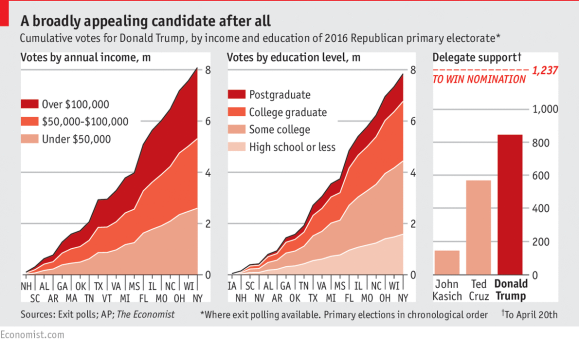Trigger warning: suicide, racism, classism
David Brooks’ New York Times column for today has already garnered a host of critical responses (most intriguing, in my opinion, this one about his casual equation of Sanders’ and Trump’s support). Let me just quickly hop into the fray to point out a particularly egregious falsehood he lazily propagated: that Trump’s support is being driven by class resentment.
As Brook’s put it:
This election — not only the Trump phenomenon but the rise of Bernie Sanders, also — has reminded us how much pain there is in this country. According to a Pew Research poll, 75 percent of Trump voters say that life has gotten worse for people like them over the last half century. This declinism intertwines with other horrible social statistics. The suicide rate has surged to a 30-year high — a sure sign of rampant social isolation. A record number of Americans believe the American dream is out of reach. And for millennials, social trust is at historic lows. Trump’s success grew out of that pain, but he is not the right response to it.
The pain he’s talking about there is admittedly as much social as it is economic, but in case the attribution of the Trump (and to a lesser extent Sanders’ too) insurgency to lower economic orders was missed, he spells it out later on – “I was surprised by Trump’s success because I’ve slipped into a bad pattern, spending large chunks of my life in the bourgeois strata — in professional circles with people with similar status and demographics to my own.”
To be frank, bullshit.
Brooks is a traveler in many circles, overwhelmingly ones that are urban and economically upwardly mobile, but several of them have been epicenters of Trumps ascendancy. Most of his time is in New York City, which Trump carried decisively and was the site of his original announcement that he would be campaigning for president. Brooks is also active at his alma mater the University of Chicago – another city with a Republican primary electorate that overwhelmingly opted support Trump.
Admittedly Brooks holds positions at Duke and a regular spot on the PBS News Hour taking him into the bubbles of moderate Republicans in Durham and Arlington respectively, but that those completely blinded him to the reality of Trump’s support in other places he works is utterly bizarre.
Brooks might claim that it’s a lower order element within New York and Chicago that he doesn’t associate with that support Trump, unlike his refined Republican colleagues. That is also, to be frank, bullshit. The Economist of all sources, a paper that you would expect to be invested in this type of narrative of deluded poor people supporting crypto-protectionism, has compiled data showing that Trump’s support is pretty evenly spread across income brackets but if anything skews slightly towards those with above median incomes.

As I’ve noted here before, Trump’s support is complicated by region and class and a number of factors, but what appears the most consistent to me is that he appeals to people tired of being told to be nicer, to be better, to be respectful to people they don’t consider worthy of respect. That appeals to a lot of less well off people, sure, but most consistently to certain social not economic demographics. It resonates with White Southerns who have wanted vindication for decades. It resonates with conservative traditionalists outside of the South who live in more generally progressive areas and as a result encounter those messages fairly often.
Can Brooks not see that or does he just not want to?




